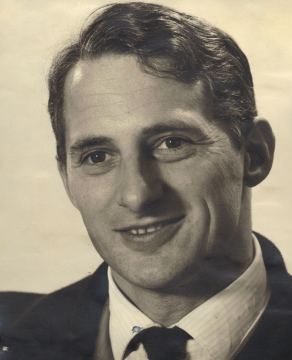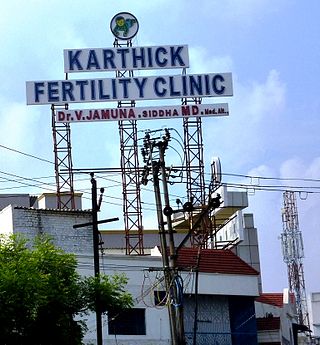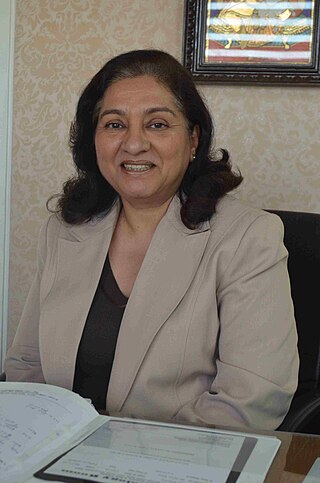Related Research Articles
Obstetrics and gynaecology is the medical specialty that encompasses the two subspecialties of obstetrics and gynaecology. The specialization is an important part of care for women's health.

In vitro fertilisation (IVF) is a process of fertilisation where an egg is combined with sperm in vitro. The process involves monitoring and stimulating a patient's ovulatory process, removing an ovum or ova from their ovaries and letting sperm fertilise them in a culture medium in a laboratory. After the fertilised egg (zygote) undergoes embryo culture for 2–6 days, it is transferred by catheter into the uterus, with the intention of establishing a successful pregnancy.

Artificial insemination is the deliberate introduction of sperm into a female's cervix or uterine cavity for the purpose of achieving a pregnancy through in vivo fertilization by means other than sexual intercourse. It is a fertility treatment for humans, and is a common practice in animal breeding, including dairy cattle and pigs.
Insemination is the introduction of sperm into a female's reproductive system for the purpose of impregnating, also called fertilizing, the female for sexual reproduction. The sperm is introduced into the uterus of a mammal or the oviduct of an oviparous (egg-laying) animal. In mammals, insemination normally occurs during sexual intercourse or copulation, but insemination can take place in other ways, such as by artificial insemination.

Edwin Carlyle "Carl" Wood,, FRANZCOG was a prominent Australian gynaecologist, best known for his pioneering work developing and commercialising the technique of in-vitro fertilisation (IVF). He gained considerable international and national attention for his wide-ranging contributions in the field of women's health over a period of almost 50 years, although not all of it was positive given the controversial nature of many of his endeavours.

Fertility clinics are medical clinics that assist couples, and sometimes individuals, who want to become parents but for medical reasons have been unable to achieve this goal via the natural course. Clinics apply a number of diagnosis tests and sometimes very advanced medical treatments to achieve conceptions and pregnancies.

Peter Robert Brinsden MBBS, MRCS, LRCP, FRCOG is known for the treatment of infertility in couples. From 1989 to 2006 he was the medical director of Bourn Hall Clinic in the UK, a leading centre for the treatment of fertility problems, and where about 6,000 babies have been conceived using IVF and other assisted conception treatments.
Carlos Sueldo is a physician and professor of obstetrics and gynaecology (OB/GYN) for the University of California, San Francisco. Dr. Sueldo is also the founder (1984) and present Director of the in vitro fertilization IVF Fertility Center. Dr. Sueldo concurrently serves as the Scientific Director at the Center for Gynecology and Reproduction (CEGYR) in Buenos Aires, Argentina, and is a founding board member of the World Endometriosis Research Foundation.
Pregnancy rate is the success rate for getting pregnant. It is the percentage of all attempts that leads to pregnancy, with attempts generally referring to menstrual cycles where insemination or any artificial equivalent is used, which may be simple artificial insemination (AI) or AI with additional in vitro fertilization (IVF).
Religious response to assisted reproductive technology deals with the new challenges for traditional social and religious communities raised by modern assisted reproductive technology. Because many religious communities have strong opinions and religious legislation regarding marriage, sex and reproduction, modern fertility technology has forced religions to respond.
The following outline is provided as an overview of and topical guide to obstetrics:
Unexplained infertility is infertility that is idiopathic in the sense that its cause remains unknown even after an infertility work-up, usually including semen analysis in the man and assessment of ovulation and fallopian tubes in the woman. It is usually an exercise in excluding all possible causes before making a diagnosis, however the age of the female partner as well as the duration of infertility are often the most scrutinized characteristics of any infertility case.
Geeta Nargund is a professor and medical doctor in the field of natural and mild IVF and Advanced Technology in Reproductive Medicine.
Alan H. DeCherney is an Obstetrician and Gynecologist who specializes in reproductive endocrinology & infertility. He is experienced in reproductive and endocrinology, infertility, and reproductive genetics.

Dr. Abayomi Ajayi is a Nigerian obstetrician/gynecologist.
Antisperm antibodies (ASA) are antibodies produced against sperm antigens.
Norbert Gleicher is an American obstetrician-gynecologist active in obstetrical practice, in vitro fertilization, reproductive endocrinology, and reproductive immunology. He is a fellow of the American College of Obstetricians and Gynecologists (FACOG) and the American College of Surgeons (ACS) and currently serves as president, medical director and chief scientist of the Center for Human Reproduction (CHR) in New York City, a clinical fertility center that he founded in 1981. Simultaneously, he is President of the Foundation for Reproductive Medicine, a not-for-profit research foundation. Gleicher maintains additional academic appointments at Rockefeller University, and Medical University of Vienna.

Jaideep Malhotra is an India-based gynecologist, infertility specialist and an ace sonologist. She is the founder of the Infertility Centre of Rainbow IVF and also serves as the director of the hospital. Malhotra received award from Prime minister of Nepal for first 100 IVF babies of Nepal and her clinic, Rainbow IVF was first in Uttar Pradesh for successful IVF, ICSI, TESA, twins and triplets.

Duru Shah is a Mumbai-based gynaecologist academic and women activist. She is the Founder President of the PCOS Society, India and a promoter of adolescent girls and women's health and infertility in India. Shah is also the promoter of Metropolis Healthcare Ltd. She is also a Consultant ObGyn.: Breach Candy Hospital, Jaslok Hospital, Mumbai.

LGBT reproduction refers to lesbian, gay, bisexual, and transgender (LGBT) people having biological children by means of assisted reproductive technology. It is distinct from LGBT parenting, which is a broader cultural phenomenon including LGBT adoption. In recent decades, developmental biologists have been researching and developing techniques to facilitate same-sex reproduction.
References
- ↑ "Nieuwe ivf-techniek kost nog geen 200 euro". De Morgen.
- ↑ "'Shoebox IVF' hope for infertile couples". BBC News. 21 June 2014.
- ↑ "Three simple ways to lower the costs of fertility care". Quartz. 15 March 2020.
- ↑ "Ziekenhuis Oost- Limburg wint award". Het Laatste Nieuws.
- ↑ "IVF as cheap as £170, doctors claim". BBC News. 8 July 2013.
- ↑ Ombelet, W. (2019). "10 years of Facts Views & Vision in Obgyn: Chief editor's report". Facts, Views & Vision in Obgyn. National Library of Medicine. 10 (4): 169–172. PMC 6658206 . PMID 31367288.
- ↑ Ben, Cohlen. "IUI: review and systematic assessment of the evidence that supports global recommendations". Human Reproduction Update . 24 (3).
- ↑ "Intra-Uterine Insemination: Evidence Based Guidelines for Daily Practice".
- ↑ Roudman, Sam (10 June 2014). "A low-tech breakthrough promises test-tube babies on the cheap". The Verge.
- ↑ Bollen, Grete (2017). "Eerste Walking Egg IVF-baby geboren in Ghana". Zolarium. p. 36.
- ↑ Quilter, Jenni (13 December 2022). "The Quest to Bring IVF to Africa". Slate.
- ↑ "Association launches affordable IVF fertility programme". Daily Graphic.
- ↑ Esson, Theresah (August 8, 2017). "Ghana adopts 'Walking Egg' technology to produce baby". Graphic Online.